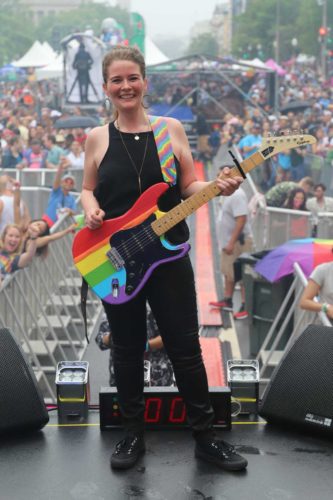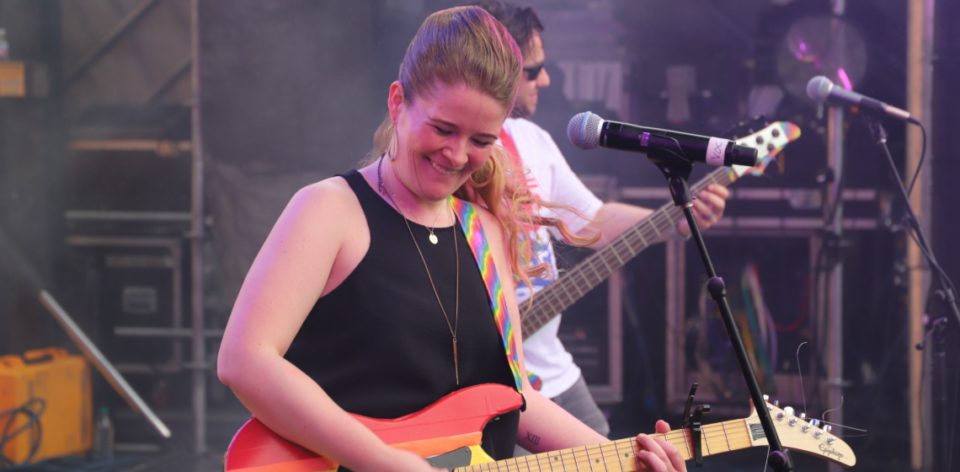We have a very special guest for the qLit community this month. A singer-songwriter who oozes female rock-star appeal with an electric rainbow guitar, no shoes, and piercing blue eyes, please welcome Michi, a lesbian musician who has already performed with pop icons such as Miley Cyrus, Carly Rae Jepsen, DJ Marshmello, and Rita Ora.
Welcome, Michi. It is a pleasure to have you with us. Can you introduce yourself?
My name is Michi (Michelle Raymond), and I’m a lesbian Indie-Pop Artist from Chester, Virginia (USA). I recently relocated to Spain to pursue a Master in Global Entertainment and Music Business at Berklee College of Music in Valencia. Just a few months ago, I was awarded the prestigious “Outstanding Women Scholarship,” an award which is only given to one woman per-year and includes a one-on-one mentorship program with Yvette Noel-Schure (Beyoncé’s publicist – yes, THAT Beyoncé).

Wow, impressive! Tell us how all this started. How did you become a musician?
I vividly remember the first time I picked up an instrument. I was two years old when I jumped off the staircase with my miniature guitar. Grinning ear-to-ear, I slid across the living room carpet on my knees, emulating the rockers I saw on TV. The year was 1989. 30 years later, I’ve traded in staircase jumping (that would almost guarantee a trip to the hospital) for rocking out on the main stage at international Pride festivals in front of crowds of 250,000 people.
Once I decided to pursue music full-time, my musical history has been moving forward ever since. Over the last three years, I have traveled the world, with my miniature rainbow guitar in tow, selling out venues in 13 countries and counting. My music spans multiple genres but is considered by most to be indie folk/pop. I’m most excited about my newest release, “Roses,” which was written, recorded, and filmed here in Europe.
Awesome clip and lyrics! It is not frequent we get to hear about out lesbian* musicians in the - emphatically masculine and heteronormative - pop world. How is it to be one?
Visibility is important within the LGBTQ community – especially among lesbians. Growing up in the late 1980’s / early 1990’s, there weren’t a lot of lesbian references or strong lesbian role models to look up to. I remember turning on the radio and hearing female artists singing love songs about men and feeling like their music was powerful, but I couldn’t relate to it. But then in 1993, when Melissa Etheridge came out of the closet, I thought to myself, ‘Wow, not only does this woman rock, she is also using her music as a platform to discuss her experiences as a lesbian woman.’ In a way, her stories and her songs made me feel visible too.
Before discovering Melissa’s music, I was writing songs about fake boyfriends and break-ups that I never had. But one day, I decided to sit down and write my first authentic song, “Change,” a heart-breaking tale of unrequited love – for another woman. Two years later, I released the song as a single, to much acclaim, earning a position in the soundtrack of a full-length feature film and winning 8th place in a U.S. national songwriting competition. The experience of writing and releasing my first authentic song has been one of my proudest moments - I consider it my “coming out” moment as a lesbian* music artist.

Talking about coming out, we like to ask people about their experiences as we all share and often struggle with this. Can you tell us a memorable coming out story of yours?
Raised in a conservative, blue-collar community in the south, I guess you could say I came out by breaking out. In 2007, while an undergraduate, I was outed in the most spectacular fashion. Upon entering a lesbian bar for the first time in my life, a drag queen on stage asked if there was anyone in the audience that wanted to perform in a battle of the bands contest due a last-minute cancelation. I raised my hand and said I’d be happy to “fill-in” as a solo artist To my surprise (and I think everyone else’s), I won first place in the contest. I was given a bouquet of sunflowers, told to smile for the camera, and then shoved off stage with a closing remark by the drag queen yelling “congratulations, you’ll find out what you won tomorrow, hun!” The next day, it was all over the radio and newspapers: a small-town, conservative, closeted lesbian had just won the headlining performance slot at the Virginia Gay Pride Festival.
What a turn of events. How did you react to this?
Instead of hiding from the news (which, by the way, spread very quickly in small-town Virginia!), I decided to embrace the opportunity and come out as an LGBTQI* artist. The decision was costly as many of the managers and artists I had been working with decided to stop working with me. What the experience did teach me, however, was resilience when faced with adversity, and the business knowledge of how to manage, book, brand, and market my own music career. Fortunately, I was able to carve out a niche market for myself early on that led to extraordinary performance opportunities worldwide that including winning a Human Rights Campaign (HRC’s) vocalist contest in Washington D.C., and performing as the opening act to a long-list of artists that I look up to and admire including Miley Cyrus, Meghan Trainor, Kelly Rowland, Carly Rae Jepsen, DJ Marshmello, Zara Larsson, Icona Pop, and Rita Ora.
If you want to learn more about Michi, check her out on social media!
Social Media & Music Links:
- Spotify: https://open.spotify.com/artist/57hRh9Y417madSTTIeZKMa
- iTunes/Apple Music: https://itunes.apple.com/us/artist/michi/1455883389
- Instagram: https://www.instagram.com/michi.music/
- Facebook: https://www.facebook.com/michimusicofficial/
- YouTube: https://www.youtube.com/channel/UCXoyu3NgGJx9d6iFCEl9Lfw/videos

